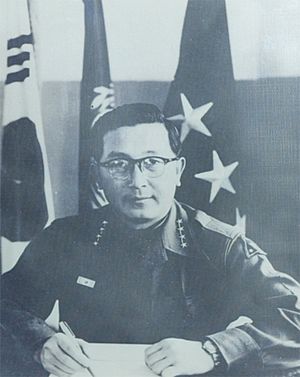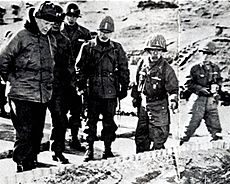Chung Il-kwon facts for kids
Quick facts for kids
Chung Il-kwon
|
|
|---|---|
| 정일권 | |

General Chung Il-kwon
|
|
| 8th Prime Minister of South Korea | |
| In office 10 May 1964 – 20 December 1970 |
|
| President | Park Chung-hee |
| Preceded by | Choi Tu-son |
| Succeeded by | Baek Du-jin |
| Personal details | |
| Born | November 21, 1917 Ussuriysk, Primorsky Krai, Russian SFSR |
| Died | January 17, 1994 (aged 76) Hawaii, United States |
| Awards | Honorary Grand Commander of the Order of the Defender of the Realm (Malaysia) |
| Military service | |
| Allegiance | |
| Branch/service | |
| Years of service | 1941–1957 |
| Rank | Captain General |
| Battles/wars | Second Sino-Japanese War Korean War |
| Chung Il-kwon | |
| Hangul | |
|---|---|
| Hanja | |
| Revised Romanization | Jeong Il-gwon |
| McCune–Reischauer | Chŏng Il-gwŏn |
| Art name | |
| Hangul | |
| Hanja | |
| Revised Romanization | Cheongsa |
| McCune–Reischauer | Ch'ŏngsa |
| Courtesy name | |
| Hangul | |
| Hanja | |
| Revised Romanization | Il-jin |
| McCune–Reischauer | Il-jin |
| Japanese name: Nakashima Ikken (中島一權) |
|
Chung Il-kwon (Korean: 정일권) was an important South Korean leader. He was a soldier, a diplomat, and a politician. He was born on November 21, 1917, and passed away on January 17, 1994. He was a general in the Republic of Korea Army. He also served as the Foreign Minister from 1963 to 1964. Later, he became the Prime Minister from 1964 to 1970. He was a close helper of President Park Chung-hee. His pen name was Chungsa (Korean: 청사).
Contents
Early Life and Education

Chung Il-kwon was born in a place called Ussuriysk in Russia. His father worked there as an interpreter for the army. After a big change in Russia in 1917, his family moved back to their hometown in Korea. In 1930, they moved again to a region called Manchuria. Chung grew up there in very difficult conditions. Because Korea was under Japanese rule when he was young, he was also known by the Japanese name Ikken Nakashima.
Military and Diplomatic Career
Chung was a very good student. He earned a spot at the military academy in Mukden. He did so well there that he was sent to another important military academy in Tokyo, Japan. He learned a lot about how to lead soldiers on horseback. During World War II, he worked as a military police captain. After the war, he was briefly captured by Soviet forces.
In 1946, Chung joined the South Korean army. He was getting military training in Hawaii when the Korean War started. He quickly returned to Korea and was promoted to major general. He became the commander of the Republic of Korea Army. His job was to bring the South Korean soldiers together and work with the United Nations Command. He led the South Korean forces in Pusan and was part of the famous Inchon attack. This attack helped stop the North Korean Army and made him a well-known war hero.
After the war, Chung retired from the military in 1957. He then started a new career as a diplomat. He served as South Korea's ambassador to several countries, including Turkey, France, and the United States. While he was an ambassador, he also studied political science and international relations at famous universities like Oxford and Harvard.
Political Leadership
From 1963 to 1964, Chung Il-kwon was the Foreign Minister of South Korea. This meant he was in charge of South Korea's relationships with other countries. Then, from 1964 to 1970, he became the Prime minister of South Korea. This was a very important role in the government.
After his time as Prime Minister, Chung continued to serve his country. From 1971, he was a member of the National Assembly, which is like the country's parliament. He served for three terms and was also the chairman of the National Assembly for a period.
Later Life and Legacy
In 1991, Chung Il-kwon received treatment for cancer in Hawaii. He continued to be involved in politics in 1992, supporting Kim Young-sam in the presidential election. Sadly, he passed away in Hawaii in January 1994 due to cancer. He received a state funeral, which is a special ceremony for important national figures. He was buried at the Seoul National Cemetery. He was survived by his wife, Park Hye-Soo, and their four children.
Honors and Achievements
Chung Il-kwon received special honors from other countries.
- He was given the Honorary Grand Commander of the Order of the Defender of the Realm from Malaysia in 1965.
Works
Chung Il-kwon also wrote books about his experiences:
- War and Ceasefire (전쟁과 휴전)
- Chung Il-kwon's Memoir (정일권 회고록, 丁一權 回顧綠)
See also
 In Spanish: Chung Il Kwon para niños
In Spanish: Chung Il Kwon para niños
 | Delilah Pierce |
 | Gordon Parks |
 | Augusta Savage |
 | Charles Ethan Porter |

